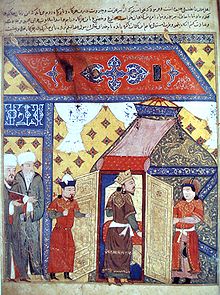
Back محمود غازان Arabic محمود غازان ARZ Mahmud Qazan Azerbaijani غازان خان AZB মাহমুদ গাজান Bengali/Bangla Mahmud Ghazan Catalan غەزان خان CKB Ghazan Ilchan German Ghazan Esperanto Ghazan Spanish
| Ghazan | |||||
|---|---|---|---|---|---|
| Khan Pādeshāh of Iran and Islam[1] | |||||
 | |||||
| Il khan | |||||
| Reign | 4 October 1295 – 11 May 1304 | ||||
| Coronation | 19 October 1295 | ||||
| Predecessor | Baydu | ||||
| Successor | Öljeitü | ||||
| Naib | Nawruz | ||||
| Viceroy of Khorasan | |||||
| Reign | 1284 - 1295 | ||||
| Predecessor | Arghun | ||||
| Successor | Nirun Aqa | ||||
| Born | 5 November 1271 Abaskun, Ilkhanate | ||||
| Died | 11 May 1304 (aged 32) Qazvin, Ilkhanate | ||||
| Consort | Yedi Kurtka Khatun Bulughan Khatun Khurasani Kököchin Bulughan Khatun Muazzama Eshil Khatun Dondi Khatun Karamun Khatun Khutulun | ||||
| |||||
| Father | Arghun | ||||
| Mother | Kultak Egechi | ||||
| Religion | Sunni Islam "after 1295", Church of the East | ||||
Mahmud Ghazan (5 November 1271 – 11 May 1304) (Persian: غازان خان, Ghazan Khan, sometimes archaically spelled as Casanus by Westerners[2]) was the seventh ruler of the Mongol Empire's Ilkhanate division in modern-day Iran from 1295 to 1304. He was the son of Arghun, grandson of Abaqa Khan and great-grandson of Hulegu Khan, continuing a long line of rulers who were direct descendants of Genghis Khan. Considered the most prominent of the il khans, he is perhaps best known for converting to Islam and meeting Imam Ibn Taymiyya in 1295 when he took the throne, marking a turning point for the dominant religion of the Mongols in West Asia: Iran, Iraq, Anatolia, and the South Caucasus.
One of his many principal wives was Kököchin, a Mongol princess (originally betrothed to Ghazan's father Arghun before his death) sent by his great-uncle Kublai Khan.
Military conflicts during Ghazan's reign included war with the Mamluk Sultanate for control of Syria and battles with the Turko-Mongol Chagatai Khanate. Ghazan also pursued diplomatic contacts with Europe, continuing his predecessors' unsuccessful attempts at forming a Franco-Mongol alliance. A man of high culture, Ghazan spoke multiple languages, had many hobbies, and reformed many elements of the Ilkhanate, especially in the matter of standardizing currency and fiscal policy.
- ^ Fragner, Bert G. (2013). "Ilkhanid rule and its contributions to Iranian political culture". In Komaroff, Linda (ed.). Beyond the legacy of Genghis Khan. Leiden: Martinus Nijhoff Brill. p. 73. ISBN 978-90-474-1857-3. Retrieved 6 April 2017.
When Ghazan Khan embraced Islam and proclaimed himself "pādishāh-i Īrān wa Islām" at the end of the thirteenth century (...)
- ^ Schein, p. 806.